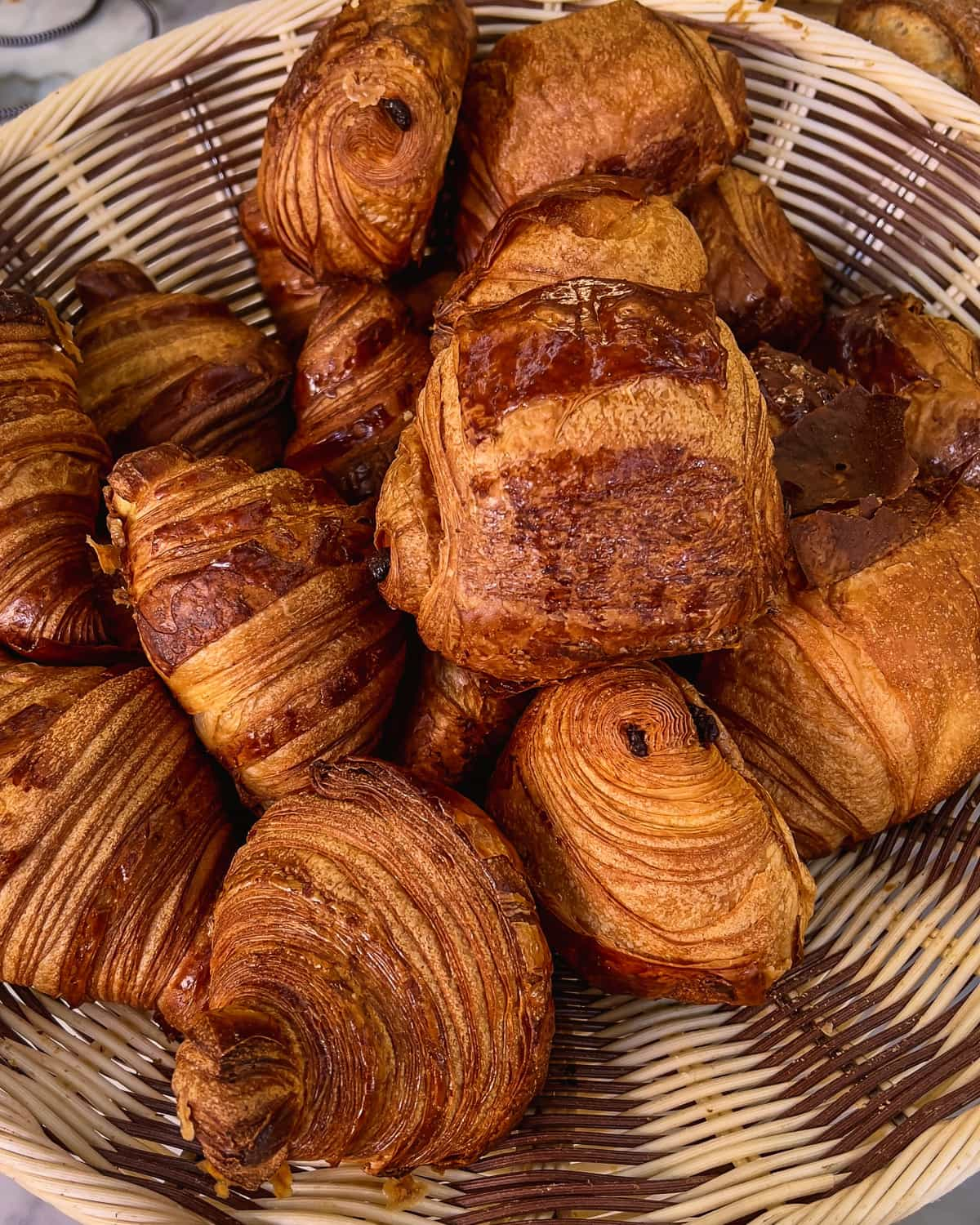Having consumed croissants at the rate of roughly 1 per day during the first 6 months after my arrival in Paris, suffice to say that I know a thing or two about why croissants are so good. Let me also be the first one to say that yes, I know that the speed at which I devoured them is not normal. I have since almost reined in my ‘croissant problem’ (as my husband puts it). Well, almost.
Because oh croissant, how do I love thee? Let me count the ways!
Almost 3 years after that glorious chapter in my life that I like to call my croissant phase, I now have some theories as to why I fell in love with croissants that hard, and what it was about them that I couldn’t get enough of. Here I share some of the reasons I have come up with. These might also help you unravel why croissants are so popular.
If I get a tad melodramatic in my professions of love for croissants in this piece, don’t say I didn’t warn you beforehand. I also want to underline that when I refer to ‘croissant’ I mean the classic ‘croissant au buerre’ or croissant made of butter which do not contain any extra topping, addition, jam, chocolate or what have you.

A brief history of les croissants
Before beginning my tribute to croissants, I need to address the buttery elephant in the room: When exactly did this humble salty-sweet pastry soar onto the level of iconic?
The croissant originates from kipferl, an Austrian bread. It crossed over to France in the 19th century, with the French embracing it with open arms. The French then put their own unique twist on the kipferl, using laminated yeast dough to create the flaky mouthful we now know as croissant.
So fiercely did its charm sweep over France, that it was honoured as a national French product in 1920. Though various versions of the croissant can be found in Spain and Italy, French croissants have remained unique with its own specific technique and taste, and dare I say, they are the best ones I’ve ever had.
As France, and particularly Paris emerged as a city that attracted tourists in droves, the fame of croissants too augmented. Technological innovation in the field of frozen food also allowed the French to ship away frozen croissant dough abroad. So no longer did bakers everywhere have to slave away with pesky and tediously hard croissants recipes. This was also a crucial next step in its internationalisation.
Exactly when and why croissants or foods such as brownies, muffins or quiches seem to have become popular fixtures in coffee shop menus across the world, is a very interesting question to ponder. However, in this article, let’s stick to why I think croissants completely merit all the love it gets. Here are some of my theories.

A croissant is what you get when carbs ascend onto nirvana
If I had to describe croissant to someone who never ate it, I would call it is a hybrid between a bread and a pastry. Indeed it belongs to it’s very own category of baked goods called viennoiserie. It has a delicate crispy texture on the outside and airy and flakey softness on the inside.
The laminated dough step in a croissant recipe consists of folding in butter into dough again and again. This results in sheets of buttery layers of dough that rise during the baking phase to give the look and taste of airy perfection in the centre of any good croissant.
Perhaps for non- Francophones, the word croissant comes across as intimidating but quiet adorably, the name refers to its crescent or moon-like shape. It’s basically a French moon pastry-bread. And much like the celestial nature of its name, a croissant I believe, is the highest ascension that carbs can ever reach.
A croissant exemplifies refined simplicity
I have spent enough hours enjoying coffee and croissant by myself, to have now arrived at some philosophical conclusions about its existential state. It is visibly light and airy inside but magnificently multi-layered at the same time. The more you bite into a croissant, the more depth you discover, not only in terms of it’s physical layers and textures but also in terms of the waves of flavours that rise within your palate one after the other: salty, sweet, buttery, fermented flour and on and on.
This is what refined simplicity is: the kind of simpleness that could be easily dismissed as elementary because of how lacklustre it might look. But just scratch the surface and you arrive at a nuanced unveiling of expertise, finesse and elegance which make the simple appear so effortless. As such, I also declare that the croissant is a reminder to appreciate refined simplicity in life.
In many ways, croissants epitomises the essence of French culinary style and perhaps French style in general, where technique and precision are crucial in creating a product that is timeless, elegant and polished. It is a refinement that is seemingly simple but which takes hours and hours of work to achieve.

Croissants are central to mine (and a lot of other people’s) first food memory in Paris
It is almost difficult to consume a croissant without feeling like you are perhaps consuming the very idea of Paris or even France. The first food I ate in Paris was croissants. And luckily, my husband ensured that I had a very good one from the stellar boulangerie in our neighborhood. (I will be sharing a list of my favorite boulangeries soon).
I have a feeling that it must be the same for so many visitors here: their first brush with the food culture in France begins with the humble-but-not-so-humble croissant. Such is the power of iconic foods that it is difficult to separate how something tastes from the memories they invoke, and what we are eating from what we felt when we first ate it.
They are a part of my husband’s love language
By now, I have written enough about how much cooking and eating bonds my husband and I. He has a repertoire of dishes he prepares for me especially when I am down and he knows I need something to cheer me up. But if he doesn’t have time and needs a shortcut, he knows just what to do.
Irrespective of the time, day or place, a surprise croissant never fails to cheer me up. So yes, they have become an implicit part of how my husband expresses his love and care for me, when he is a bit pressed for time.
I hope you enjoyed reading about my love for croissants and I am curious to know if you feel the same way about it?

